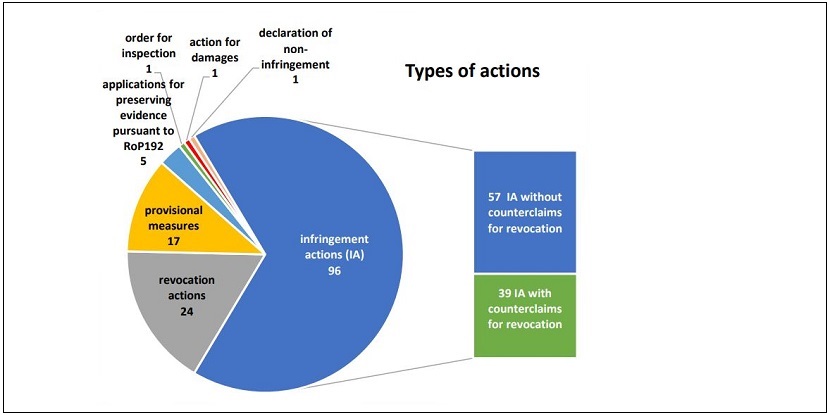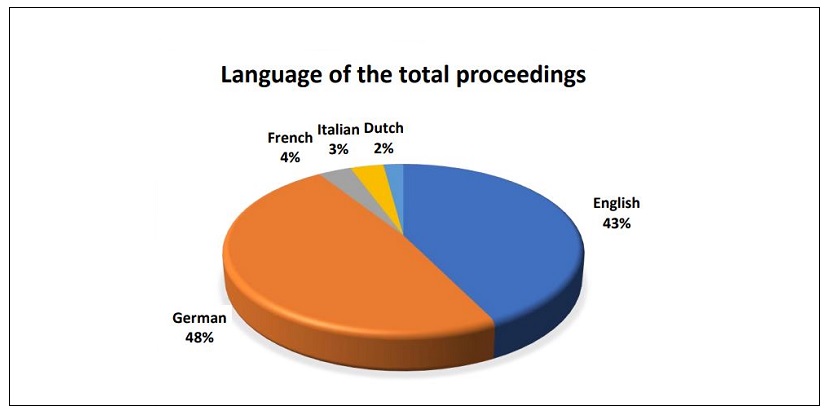English UPC cases rise, but German still dominant language
Since November 2023, companies have filed more UPC lawsuits in English than in German – with the latter still just ahead in terms of the number of cases in which it is the language of proceedings. However, should the trend for parties to file in English continue, then the discussion about a uniform language regulation for UPC proceedings is likely to gain new impetus.
15 March 2024 by Mathieu Klos
A high-ranking Unified Patent Court judge recently told a conference audience that the official internal language at the UPC is English. But this is not the case when it comes to the language of proceedings at the new court, where German dominates. Recently, however, English has caught up considerably. Since November 2023, parties have filed more UPC cases in this language than in any other.
UPC cases by language
At the beginning of March, the UPC published new case number statistics. These show that companies filed 274 cases by the end of February, including 129 counterclaims of revocation filed in connection to 39 of the 96 infringement cases.
Experts are now debating whether the court should treat infringement proceedings and counterclaims for revocation as one case, especially as the UPC rules allow each sub-company on the defendant side to submit its own counterclaim. Although the counterclaims are usually identical in terms of content and language, UPC statistics count them multiple times.
Infringement proceedings dominate at the UPC

The number of proceedings at the UPC is increasing significantly. ©Unified Patent Court
According to UPC information, the court conducts 48% of proceedings in German and 43% of proceedings in English. The remaining 9% are in Dutch, French and Italian. The number of English-language proceedings is therefore catching up to the number of those in German.
Last summer, things looked very different. Many companies that initially filed suits at the German local divisions had submitted them in German. Many of these were prepared before the UPC started on 1 June, with the German government only enacting the now-valid rule that the German local divisions may also hear cases in English following the court’s launch.
According to the first survey of case numbers by the UPC, at the end of 2023, parties still filed 49% of cases in German. Only 40% were filed in English, with parties filing the remaining cases in Dutch, French and Italian.
The language battle: English vs. German

Between November 2023 and the end of February 2024, more cases were filed in English: but German still dominates as the language of proceedings. ©Unified Patent Court
However, a JUVE Patent analysis of the UPC’s publicly available information shows that, since November, the tide is turning in favour of English. This includes infringement proceedings and applications for provisional measures, as well as isolated revocation actions. Counterclaims for revocation do not play a role.
While, at the end of October, 42 actions were pending in German and only 37 in English, the UPC published 50 new cases in its case search between the beginning of November and 12 March. Of these, plaintiffs filed 24 cases in English and only 21 in German. Parties also filed three in French and one in Dutch.
It is striking that parties suing at the Scandinavian division file lawsuits exclusively in English; at the Paris central and local divisions, companies also predominantly file in English.
Recently, however, the Mannheim, Munich and Düsseldorf local divisions have received several English-language lawsuits, including those filed by Network System Technologies against Texas Instruments, Audi and Volkswagen, by NEC against TCL, and by Motorola against Ericsson in Munich. In Düsseldorf, for example, Sanofi sued Amgen in English, as did Dexcom against Edwards Lifesciences.
The discussion continues
Even before the court’s launch, the patent community conducted various discussions as to which language is correct for proceedings. It remains a hot topic among lawyers, patent attorneys, in-house representatives and UPC judges. Many experts foresee English becoming the language of proceedings in the long term; some UPC judges have recently expressed this view at conferences.
When preparing suits for the German local divisions, for example, the composition of the judges’ panel seems a decisive factor in whether a party will file in German or English. One patent lawyer says, “If we get the impression that the foreign judge does not have a perfect command of German, we play it safe and file in English.”
Apparently, the size and origin of the company does not necessarily determine whether a party will sue in the national language of the UPC division. Some medium-sized companies recently filed lawsuits in English at German local divisions, such as the Danish medical device manufacturer Qufora, the Austrian manufacturer of protective clothing Texport, and the Munich-based bottle manufacturer Air up Group.
However, the majority of small and medium-sized companies have so far filed in the national language of the court.
